高考英语备考经验交流共21页文档
高考英语经验交流

四.学以致用,体验快乐 1. 很多时候语法课会出现“老师讲得天花乱坠,学生听得昏昏欲睡”的现象。 我在复习定语从句这个专题时,没有把所有的规则罗列出来,而是从基本的 规则入手,学生在学了语法规则之后,运用在填空里的动词考点和答题技巧
上,这样学生不仅解决了学习的困难,内心激发了学习的快乐感。 2.翻看错题本,达到温故知新的效果
节定成败
五. 教师的治学态度和积极心态影响学生的学习态度。 1. 学生的身上可以看到教师的影子。如果教师认真对待每节课和每次考试, 紧追不放那些不完成任务的学生,学生就不敢轻易懈怠, 浑水摸鱼。 没有 不想玩的孩子,尤其是那些懒惰的学生内心迫切希望老师能够严格管理, 监督有效。被学生喜爱和敬佩的老师往往是那些教学有方,管理有序的老师。
的深入,“错题本”中的错误质量会越来越高,数量会越来越少,更多是由 于
概念点和思路而引发的错误,这些题就是属于考试犯错的典型类型。 俗话 说,吃一堑,长一智。只要坚持下来,善待错误,学生很快将会欣喜地发 现,错误会变得越来越少,得分率提高了,学习过程中不时感受到成功和信
心。 以上的做法关键在于抓落实,说到底,还是时间和汗水,功夫要做细,细
2. 重视背诵,抓落实 由于第一轮复习是之后几轮复习的基础,在第一轮复习中
背书就显得尤为重要。在第一轮复习中同学们一定要保证把 复习的内容至少背一遍,最好两遍。学生在积累了一定的关 键句式和常见文章后,在写作和短文改错不像以前那样困难 了。这段时间是考验老师耐心的阶段,就是和学生磨,不轻 易放过一个学生,要求记住的内容必须落实到位。
三.关心学生,走近学生 1. 亲其师信其道
如果说自信是成功的开端,那么对教师的信赖就是取得成功的巨大动力。一 个不相信老师能力的学生、常常会鸡蛋里挑骨头学习这门科一定是被动的, 抵触的,高考复习最忌讳的就是这种消极情绪。信师本身就是对自己选择的 一种肯定,信赖老师,学生才会乐意接受你的建议,鼓励和批评教育,他们 才会自觉运用教师所教的方法,学习中不断取得。断进步。因此师生之间关
高三英语备考经验交流发言稿英语
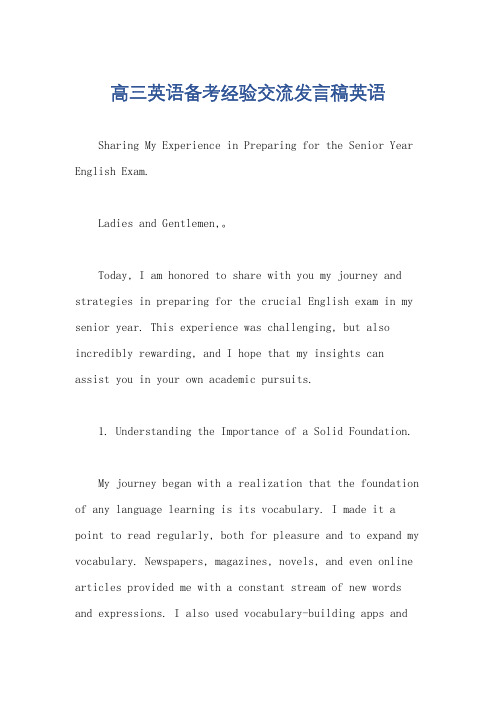
高三英语备考经验交流发言稿英语Sharing My Experience in Preparing for the Senior Year English Exam.Ladies and Gentlemen,。
Today, I am honored to share with you my journey and strategies in preparing for the crucial English exam in my senior year. This experience was challenging, but also incredibly rewarding, and I hope that my insights canassist you in your own academic pursuits.1. Understanding the Importance of a Solid Foundation.My journey began with a realization that the foundation of any language learning is its vocabulary. I made it a point to read regularly, both for pleasure and to expand my vocabulary. Newspapers, magazines, novels, and even online articles provided me with a constant stream of new words and expressions. I also used vocabulary-building apps andgames to make the process more enjoyable and engaging.2. The Power of Practice.Practice was key in honing my language skills. Istarted by setting aside a specific time every day for English practice, whether it was reading, writing, speaking, or listening. I engaged in mock tests and writing exercises to familiarize myself with the question formats and time constraints. This consistent practice helped me identify my weak areas and focus my revision efforts accordingly.3. Mastering Grammar.Grammar is often a tricky aspect of language learning, but I found that understanding its logic and rules made it easier to apply. I invested time in revising and understanding the basic principles of grammar, and then moved on to more complex structures. Regular practice of grammar exercises and sentence correction helped me internalize these rules and apply them naturally in my writing and speaking.4. Reading Comprehension.Reading comprehension is a crucial skill for theEnglish exam. I developed this skill by reading a widerange of materials, from simple newspapers to complexliterary works. This diverse reading exposure helped me understand different writing styles, perspectives, and vocabularies. I also practiced reading comprehension exercises regularly, focusing on improving my speed and accuracy.5. Writing Skills.Writing is another area that requires constant practice.I started by writing simple essays and gradually moved onto more complex writing tasks. I emphasized on clarity, coherence, and the effective use of vocabulary and grammar. Regular revision and feedback from teachers and peers were invaluable in improving my writing skills.6. Listening Skills.Listening is often overlooked, but it is a crucialskill for English language learning. I listened to English podcasts, news, and movies to improve my listening comprehension. I also practiced listening comprehension exercises, focusing on improving my ability to understand spoken English at different speeds and accents.7. Managing Stress and Staying Motivated.Lastly, managing stress and staying motivated are crucial aspects of successful exam preparation. The senior year can be extremely stressful, but it is important to find ways to relax and recharge. I found that setting realistic goals, rewarding myself for small achievements, and sharing my progress with friends and family kept me motivated and positive.In conclusion, my journey in preparing for the senior year English exam was challenging but rewarding. I believe that with a solid foundation, regular practice, and effective strategies, anyone can achieve success in thisexam. Thank you for listening to my share, and I hope that my experience can inspire and assist you in your own academic journey.。
高考英语备考交流发言稿(精选5篇)

高考英语备考交流发言稿(精选5篇)高考英语备考交流篇1大家好。
冬去春来,又到春暖花开,万物复苏的季节,高三同学的英语复习也已进入二轮复习阶段。
在距高考百日的时间里,如何备考英语,才能起到事半功倍的效果?这是我们每位同学非常关心的问题。
作为一位老教师,我愿意和同学们在此一起共同探讨这一问题。
一、端正心态,战胜自我,自强不息心有多高,命就有多大。
二轮复习已是决战高考的冲刺阶段。
同学们都在争分夺秒,激流勇进。
但也有同学出现学习效率不高,停滞不前,甚至于有少数同学对英语学习失去信心,抱着破罐子破摔的想法。
我认为关键时期,师生们要同舟共济,互相激励;有一种积极向上、乐观睿智的心态;同学们要战胜自我,自强不息,克服自卑,树立信心,尽快走出高原区,迎接柳暗花明的无限春光。
二、继续扩大词汇量,重在提升词汇活用能力俗话说“巧妇难为无米之炊”。
词汇量的多少直接影响我们的英语成绩。
说实话,我们很多同学还没有达到《考试大纲》要求的3000词汇量,迄今为止部分同学甚至连一些常用的词汇都不能正确使用。
语法知识掌握也不够扎实。
因此,我们在二轮复习中要巩固所学知识,强化记忆,进一步扩大词汇量。
单词复习最好做到词不离句,句不离文。
高考越来越重视词汇在具体语境中的应用,不拘泥那种仅从单词本身出发的较为死板的考法。
以“cover”为例,在不同的语境中就有不同的用法。
Don’t cover your eyes with hands.( vt.覆盖、遮住) He made up a story to cover the mistakes.(vt.掩饰) China covers a total area of 96000000 square kilometrers.(vt占地) The cover of the magazine is green.(n.封面) His book covers a wild field. (vt.涉及) They covered 100 miles a day.(vt.走过) The journalist was sent to cover the traffic accident.(vt.采访) 由cover一词可见,具体语境对于词汇学习不可小觑。
英语高三备考经验交流材料
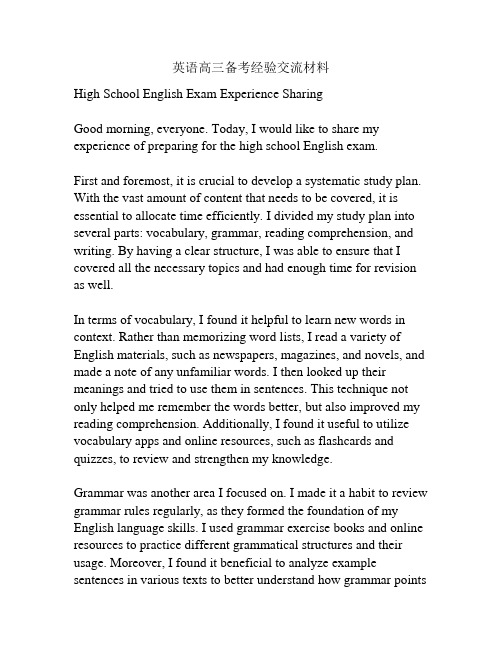
英语高三备考经验交流材料High School English Exam Experience SharingGood morning, everyone. Today, I would like to share my experience of preparing for the high school English exam.First and foremost, it is crucial to develop a systematic study plan. With the vast amount of content that needs to be covered, it is essential to allocate time efficiently. I divided my study plan into several parts: vocabulary, grammar, reading comprehension, and writing. By having a clear structure, I was able to ensure that I covered all the necessary topics and had enough time for revision as well.In terms of vocabulary, I found it helpful to learn new words in context. Rather than memorizing word lists, I read a variety of English materials, such as newspapers, magazines, and novels, and made a note of any unfamiliar words. I then looked up their meanings and tried to use them in sentences. This technique not only helped me remember the words better, but also improved my reading comprehension. Additionally, I found it useful to utilize vocabulary apps and online resources, such as flashcards and quizzes, to review and strengthen my knowledge.Grammar was another area I focused on. I made it a habit to review grammar rules regularly, as they formed the foundation of my English language skills. I used grammar exercise books and online resources to practice different grammatical structures and their usage. Moreover, I found it beneficial to analyze example sentences in various texts to better understand how grammar pointswere applied in real-life situations.When it came to reading comprehension, I realized the importance of practicing different types of texts. I made use of past exam papers as well as additional reading materials, such as newspapers, articles, and short stories. I paid close attention to the main idea of each passage and tried to summarize the key points. By doing so, I improved my ability to locate specific information quickly and effectively. Furthermore, I practiced skimming and scanning techniques to save time during the exam.Writing was the area I focused on the most. I wrote essays on a wide range of topics, paying attention to the introduction, body paragraphs, and conclusion. I sought feedback from my teachers and classmates to identify areas for improvement. I also made sure to practice different types of writing, such as argumentative essays, narrative essays, and descriptive essays, to expand my range of writing skills. I learned how to craft strong thesis statements and arguments, as well as how to present my ideas coherently and persuasively.In addition to these study strategies, I also found it helpful to surround myself with English as much as possible. I listened to English podcasts, watched English movies, and engaged in conversations with classmates and teachers in English. Immersing myself in the language allowed me to become more comfortable with it and improve my listening and speaking skills.In conclusion, preparing for the high school English exam requires a systematic study plan, including vocabulary, grammar, readingcomprehension, and writing. By consistently reviewing and practicing these areas, along with immersing ourselves in English as much as possible, we can improve our English language skills and achieve success in the exam. Good luck to all of you!。
高三备考交流材料(英语)
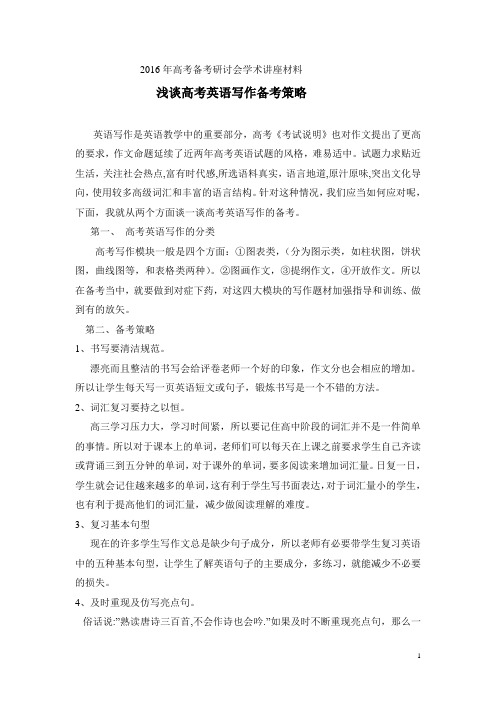
2016年高考备考研讨会学术讲座材料浅谈高考英语写作备考策略英语写作是英语教学中的重要部分,高考《考试说明》也对作文提出了更高的要求,作文命题延续了近两年高考英语试题的风格,难易适中。
试题力求贴近生活,关注社会热点,富有时代感,所选语料真实,语言地道,原汁原味,突出文化导向,使用较多高级词汇和丰富的语言结构。
针对这种情况,我们应当如何应对呢,下面,我就从两个方面谈一谈高考英语写作的备考。
第一、高考英语写作的分类高考写作模块一般是四个方面:①图表类,(分为图示类,如柱状图,饼状图,曲线图等,和表格类两种)。
②图画作文,③提纲作文,④开放作文。
所以在备考当中,就要做到对症下药,对这四大模块的写作题材加强指导和训练、做到有的放矢。
第二、备考策略1、书写要清洁规范。
漂亮而且整洁的书写会给评卷老师一个好的印象,作文分也会相应的增加。
所以让学生每天写一页英语短文或句子,锻炼书写是一个不错的方法。
2、词汇复习要持之以恒。
高三学习压力大,学习时间紧,所以要记住高中阶段的词汇并不是一件简单的事情。
所以对于课本上的单词,老师们可以每天在上课之前要求学生自己齐读或背诵三到五分钟的单词,对于课外的单词,要多阅读来增加词汇量。
日复一日,学生就会记住越来越多的单词,这有利于学生写书面表达,对于词汇量小的学生,也有利于提高他们的词汇量,减少做阅读理解的难度。
3、复习基本句型现在的许多学生写作文总是缺少句子成分,所以老师有必要带学生复习英语中的五种基本句型,让学生了解英语句子的主要成分,多练习,就能减少不必要的损失。
4、及时重现及仿写亮点句。
俗话说:”熟读唐诗三百首,不会作诗也会吟.”如果及时不断重现亮点句,那么一定可以激活学生们的神经兴奋点,从而加深记忆.我在教学实践中,常重现这样的句子,下面列举一些:谚语a、As an old saying goes, nothing is too difficult if you put your heart into it .俗话说,世上无难事,只怕有心人。
高三英语复习备考经验交流

高三英语复习备考经验交流.doc高三英语复习备考经验交流相互研究共同提高高三英语复习备考经验交流马继海一、取得的成绩2019年6月24日高考放榜了,我校在2019年的高考中取得了可喜的成绩,再次创造了新的辉煌。
今年高考英语试卷整体难度增加,但我校英语学科仍然取得了非常优异的成绩,在今年的高考中,我校英语成绩在140分以上的共有4人,其中李佳慧同学以142分的成绩夺得了2019年高考博州英语单科状元,李卓昕、刘逸博同学英语都考了141分,韩凌霄同学英语140分。
第一层次黄尖班高三(15)班平均分125分,第二层次两个黄冈班平均分106。
四个实验班平均分在80分左右,理科平行班平均分70分左右,文科实验班平均分90分左右,文科平行班68分左右。
二、具体做法回顾过去一年的备考工作,我们主要做到以下几点:1、制定好三轮复习计划。
第一轮以基础知识为主,抓单词的拼写、词汇、句型的积累和活用以及重要语法的掌握。
第一轮复习对于全年级各个层次班级的学生来说都非常重要,通过这些年的教学和学生的实际情况,我认为步步高系列全国版的一轮资料比较适合我们的学生,从基础词汇、重点短语、重点句型都和我们的教材同步,配套练习里,每单元还有一个要求运用以本单元所学内容进行微作文的写作练习,不仅使学生进一步巩固了已学词汇,而且很好的练习了书面表达能力。
第二轮则以专项指导和训练为主,其中阅读和写作为重中之重。
我个人认为,二轮专题中的大部分内容其实在一轮复习时,已经穿插复习了,包括阅读和写作在一轮复习中已经花费了大量时间去练习。
因此,二轮复习时,主要是结合专题练习进行查巩固加强。
最后,第三轮是以综合模拟试卷类为主,主要以高考模式为主,不仅要训练学生的答题能力,还要注重答题技巧的培养和高考试卷答题规范性的要求和强调。
以今年高考阅卷的情况为例,在写作、短文改错、语法填空题作答时,仍然有学生不能够严格按照试卷要求进行答题。
在三轮复习中还要注意查漏补缺,根据学生的实际复习备考情况再对训练的内容进行调整。
2023年高考英语备考经验交流发言材料 (3)
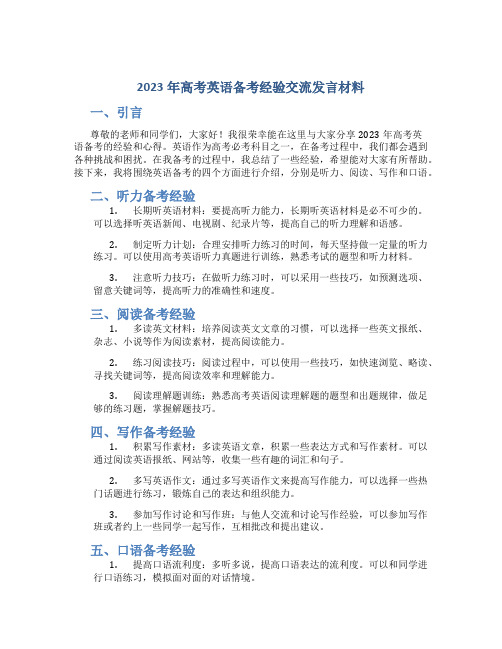
2023年高考英语备考经验交流发言材料一、引言尊敬的老师和同学们,大家好!我很荣幸能在这里与大家分享2023年高考英语备考的经验和心得。
英语作为高考必考科目之一,在备考过程中,我们都会遇到各种挑战和困扰。
在我备考的过程中,我总结了一些经验,希望能对大家有所帮助。
接下来,我将围绕英语备考的四个方面进行介绍,分别是听力、阅读、写作和口语。
二、听力备考经验1.长期听英语材料:要提高听力能力,长期听英语材料是必不可少的。
可以选择听英语新闻、电视剧、纪录片等,提高自己的听力理解和语感。
2.制定听力计划:合理安排听力练习的时间,每天坚持做一定量的听力练习。
可以使用高考英语听力真题进行训练,熟悉考试的题型和听力材料。
3.注意听力技巧:在做听力练习时,可以采用一些技巧,如预测选项、留意关键词等,提高听力的准确性和速度。
三、阅读备考经验1.多读英文材料:培养阅读英文文章的习惯,可以选择一些英文报纸、杂志、小说等作为阅读素材,提高阅读能力。
2.练习阅读技巧:阅读过程中,可以使用一些技巧,如快速浏览、略读、寻找关键词等,提高阅读效率和理解能力。
3.阅读理解题训练:熟悉高考英语阅读理解题的题型和出题规律,做足够的练习题,掌握解题技巧。
四、写作备考经验1.积累写作素材:多读英语文章,积累一些表达方式和写作素材。
可以通过阅读英语报纸、网站等,收集一些有趣的词汇和句子。
2.多写英语作文:通过多写英语作文来提高写作能力,可以选择一些热门话题进行练习,锻炼自己的表达和组织能力。
3.参加写作讨论和写作班:与他人交流和讨论写作经验,可以参加写作班或者约上一些同学一起写作,互相批改和提出建议。
五、口语备考经验1.提高口语流利度:多听多说,提高口语表达的流利度。
可以和同学进行口语练习,模拟面对面的对话情境。
2.练习口语题型:熟悉高考口语考试的题型和考察点,进行针对性的口语练习。
3.参加口语角和英语演讲比赛:参加口语角活动,和其他同学交流和练习口语能力。
高三英语复习经验交流发言稿
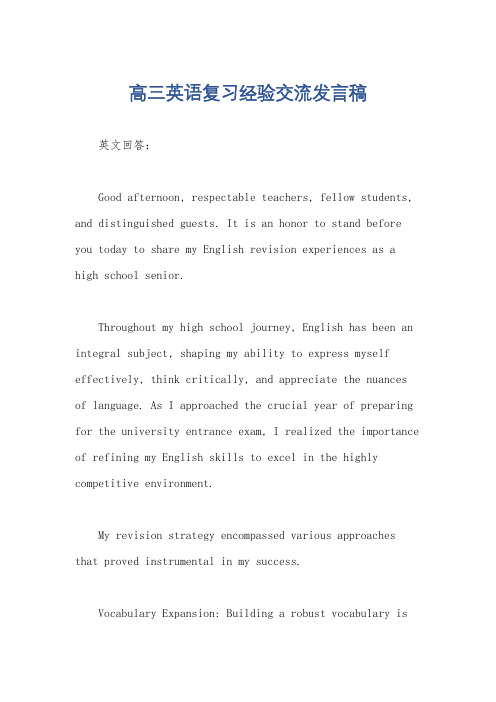
高三英语复习经验交流发言稿英文回答:Good afternoon, respectable teachers, fellow students, and distinguished guests. It is an honor to stand before you today to share my English revision experiences as a high school senior.Throughout my high school journey, English has been an integral subject, shaping my ability to express myself effectively, think critically, and appreciate the nuances of language. As I approached the crucial year of preparing for the university entrance exam, I realized the importance of refining my English skills to excel in the highly competitive environment.My revision strategy encompassed various approachesthat proved instrumental in my success.Vocabulary Expansion: Building a robust vocabulary isparamount in English proficiency. I immersed myself in reading diverse materials, including books, articles, and online resources, to encounter a wide range of words and their usage. I meticulously recorded unfamiliar words in a notebook, along with their definitions and example sentences. I regularly reviewed these words through flashcards and quizzes to enhance my recall.Grammar Reinforcement: A solid understanding of grammar is the foundation of effective communication. I assiduously studied grammar rules and practiced applying them inwriting and speaking. I completed numerous exercises and mock exams to test my comprehension and identify areas for improvement. Seeking clarification from teachers and peers was invaluable in solidifying my grammar knowledge.Reading Comprehension Enhancement: Reading comprehension is a crucial skill for processing written information and extracting its meaning. I engaged in active reading techniques such as previewing, predicting, and questioning while reading. I highlighted key points, made inferences, and connected ideas to enhance my understanding.Frequent practice with different text types, including essays, articles, and literary works, improved my ability to analyze and interpret written material effectively.Writing Development: Writing is an essential tool for expressing thoughts and ideas clearly and concisely. I dedicated ample time to practicing various writing genres, such as essays, reports, and summaries. I sought feedback from teachers and classmates to refine my writing style, structure, and grammar. Regular writing exercises not only improved my writing proficiency but also boosted my confidence in expressing myself through written communication.Speaking Practice: Speaking is an equally vital aspect of English proficiency. I participated in as many speaking opportunities as possible, including class discussions, presentations, and debates. I prepared thoroughly for these occasions to ensure clarity, organization, and effective delivery. Listening attentively to others and actively engaging in discussions enhanced my listening comprehension and oral communication skills.In addition to these specific revision techniques, I also adopted broader strategies to optimize my learning.Time Management: I meticulously planned my revision schedule to allocate adequate time to each English skill. I prioritized areas that needed more attention and set realistic goals to avoid overwhelming myself. Breaks and relaxation periods were essential to maintain focus and prevent burnout.Consistency and Discipline: Regular revision is more effective than sporadic cramming. I consistently dedicated time to English revision, even on days when motivation was low. Discipline and perseverance played a pivotal role in my progress.Collaboration and Support: I sought support from teachers, classmates, and online forums. Discussing concepts, sharing ideas, and collaborating on projects enriched my learning experience and provided valuable perspectives.Motivation and Mindset: Staying motivated throughoutthe revision process is crucial. I set clear goals, tracked my progress, and rewarded myself for achievements. Apositive mindset and belief in my abilities empowered me to overcome challenges and strive for excellence.The culmination of these efforts was reflected in my outstanding performance in the university entrance exam. My English score exceeded my expectations, and I am now pursuing my dream of studying English literature at my desired university.I extend my heartfelt gratitude to my teachers, mentors, and peers who have supported and guided me on this transformative journey. I encourage all high school seniors embarking on their own revision paths to approach their studies with determination, embrace challenges, and seek support whenever needed.Remember, the journey to English proficiency is not without its obstacles, but with perseverance, dedication,and the right strategies, you can unlock your potential and achieve your academic aspirations.Thank you.中文回答:尊敬的老师、同学们、来宾们,下午好。
高三英语复习备考经验交流
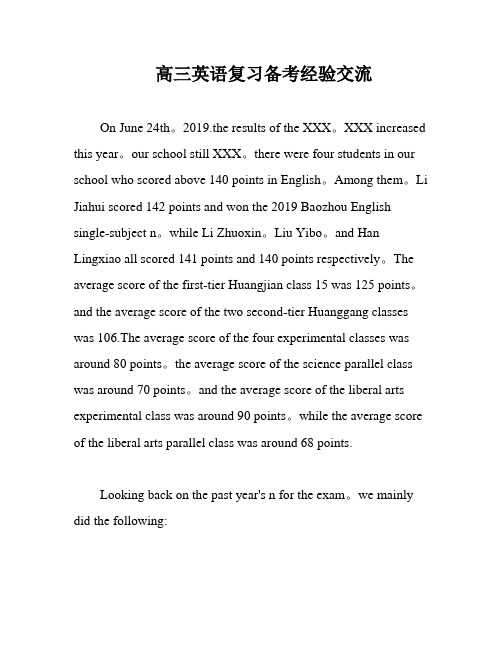
高三英语复习备考经验交流On June 24th。
2019.the results of the XXX。
XXX increased this year。
our school still XXX。
there were four students in our school who scored above 140 points in English。
Among them。
Li Jiahui scored 142 points and won the 2019 Baozhou English single-subject n。
while Li Zhuoxin。
Liu Yibo。
and Han Lingxiao all scored 141 points and 140 points respectively。
The average score of the first-tier Huangjian class 15 was 125 points。
and the average score of the two second-tier Huanggang classes was 106.The average score of the four experimental classes was around 80 points。
the average score of the science parallel class was around 70 points。
and the average score of the liberal arts experimental class was around 90 points。
while the average score of the liberal arts parallel class was around 68 points.Looking back on the past year's n for the exam。
高考英语备考经验分享
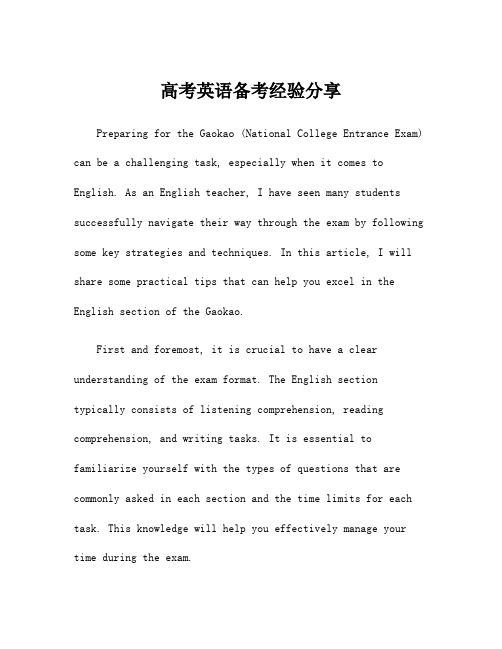
高考英语备考经验分享Preparing for the Gaokao (National College Entrance Exam) can be a challenging task, especially when it comes to English. As an English teacher, I have seen many students successfully navigate their way through the exam by following some key strategies and techniques. In this article, I will share some practical tips that can help you excel in the English section of the Gaokao.First and foremost, it is crucial to have a clear understanding of the exam format. The English section typically consists of listening comprehension, reading comprehension, and writing tasks. It is essential to familiarize yourself with the types of questions that are commonly asked in each section and the time limits for each task. This knowledge will help you effectively manage your time during the exam.To improve your listening skills, regular practice is essential. Listen to a variety of audio materials such as news reports, interviews, and podcasts. Try to exposeyourself to different accents and speech patterns to develop a better understanding of spoken English. Utilize online resources and apps that provide listening exercises and mock tests to enhance your listening comprehension abilities.When it comes to reading comprehension, focus on building your vocabulary and reading speed. Read a variety of texts, including newspapers, magazines, and academic articles. Pay attention to the structures and vocabulary used in the passages. Additionally, practice summarizing the main points of the texts and answering comprehension questions. This will help you both in understanding the passages and answering related questions more effectively.Writing is another crucial aspect of the English section. Start by improving your grammar and vocabulary. Expand yourvocabulary by learning new words and phrases every day. Create a personal vocabulary list and review it regularly. Practice writing different types of essays, such as argumentative, narrative, and descriptive essays. Pay attention to the organization and coherence of your writing. It is also important to practice writing within the time limits to manage your time effectively during the exam.To enhance your overall English proficiency, immerse yourself in an English-speaking environment as much as possible. Engage in conversations with English speakers, watch English movies and TV shows, and listen to English music. This will help you improve your listening skills, enhance your understanding of colloquial language, and expand your vocabulary.In addition to self-study, consider joining a preparation course or finding a study group. Collaborating with others can provide valuable opportunities for discussion, practice,and feedback. Practice speaking in English and participate in debates or discussions. This will not only improve your speaking abilities but also boost your confidence in expressing your ideas fluently.During the exam, time management is critical. Familiarize yourself with the time allocation for each section and plan your time accordingly. Allocate more time to areas that you find more challenging. Be mindful of the time while reading passages and answering questions. Pace yourself to ensurethat you have sufficient time to complete all tasks.Lastly, maintain a positive mindset throughout your preparation and during the exam. Believing in your abilities and staying motivated will go a long way in achieving success. Remember to take regular breaks during your study sessions to avoid burnout and maintain focus.In conclusion, excelling in the English section of the Gaokao requires a combination of diligent practice, effectivetime management, and a positive mindset. By following these tips, you can enhance your listening, reading, writing, and speaking skills, ultimately increasing your chances of achieving a high score in the Gaokao. Good luck with your exam preparations!。
(英语篇)备战高考学习经验交流
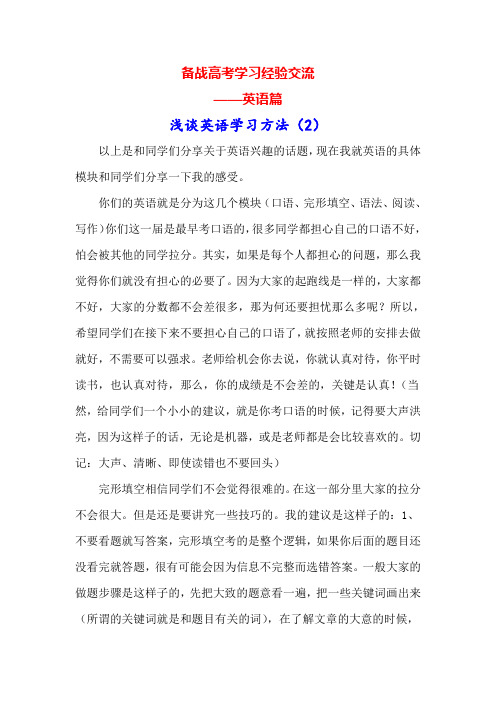
备战高考学习经验交流——英语篇浅谈英语学习方法(2)以上是和同学们分享关于英语兴趣的话题,现在我就英语的具体模块和同学们分享一下我的感受。
你们的英语就是分为这几个模块(口语、完形填空、语法、阅读、写作)你们这一届是最早考口语的,很多同学都担心自己的口语不好,怕会被其他的同学拉分。
其实,如果是每个人都担心的问题,那么我觉得你们就没有担心的必要了。
因为大家的起跑线是一样的,大家都不好,大家的分数都不会差很多,那为何还要担忧那么多呢?所以,希望同学们在接下来不要担心自己的口语了,就按照老师的安排去做就好,不需要可以强求。
老师给机会你去说,你就认真对待,你平时读书,也认真对待,那么,你的成绩是不会差的,关键是认真!(当然,给同学们一个小小的建议,就是你考口语的时候,记得要大声洪亮,因为这样子的话,无论是机器,或是老师都是会比较喜欢的。
切记:大声、清晰、即使读错也不要回头)完形填空相信同学们不会觉得很难的。
在这一部分里大家的拉分不会很大。
但是还是要讲究一些技巧的。
我的建议是这样子的:1、不要看题就写答案,完形填空考的是整个逻辑,如果你后面的题目还没看完就答题,很有可能会因为信息不完整而选错答案。
一般大家的做题步骤是这样子的,先把大致的题意看一遍,把一些关键词画出来(所谓的关键词就是和题目有关的词),在了解文章的大意的时候,你就可以做题啦。
2、在做题的时候,切记要时刻联系上下文,发现遇到不会的,就在上下文找一下。
还有就是完形填空还会考一些词语辨析的,很多时候很多词很相似,但意思却是很不同,这个时候,你就要在平时留心了。
不要混淆单词了,不然在完形填空里你会很吃亏。
3、完形填空考得是语感,所以,同学们在平时的读书、练习中夜要注意啦。
很多题目你不知道原因,但是你就是选对了,何解?语感惹的祸。
哈哈!4、真的很多办法都试过之后你还是不会时,就——放弃。
放弃是很必要的,你的时间有限,如果花太多时间去和一道难题纠结,你就会得不偿失了。
英语高考备考经验交流
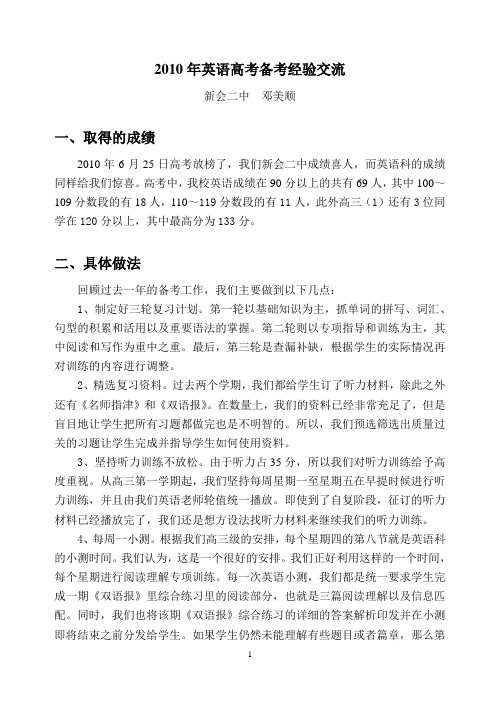
2010年英语高考备考经验交流新会二中邓美顺一、取得的成绩2010年6月25日高考放榜了,我们新会二中成绩喜人,而英语科的成绩同样给我们惊喜。
高考中,我校英语成绩在90分以上的共有69人,其中100~109分数段的有18人,110~119分数段的有11人,此外高三(1)还有3位同学在120分以上,其中最高分为133分。
二、具体做法回顾过去一年的备考工作,我们主要做到以下几点:1、制定好三轮复习计划。
第一轮以基础知识为主,抓单词的拼写、词汇、句型的积累和活用以及重要语法的掌握。
第二轮则以专项指导和训练为主,其中阅读和写作为重中之重。
最后,第三轮是查漏补缺,根据学生的实际情况再对训练的内容进行调整。
2、精选复习资料。
过去两个学期,我们都给学生订了听力材料,除此之外还有《名师指津》和《双语报》。
在数量上,我们的资料已经非常充足了,但是盲目地让学生把所有习题都做完也是不明智的。
所以,我们预选筛选出质量过关的习题让学生完成并指导学生如何使用资料。
3、坚持听力训练不放松。
由于听力占35分,所以我们对听力训练给予高度重视。
从高三第一学期起,我们坚持每周星期一至星期五在早提时候进行听力训练,并且由我们英语老师轮值统一播放。
即使到了自复阶段,征订的听力材料已经播放完了,我们还是想方设法找听力材料来继续我们的听力训练。
4、每周一小测。
根据我们高三级的安排,每个星期四的第八节就是英语科的小测时间。
我们认为,这是一个很好的安排。
我们正好利用这样的一个时间,每个星期进行阅读理解专项训练。
每一次英语小测,我们都是统一要求学生完成一期《双语报》里综合练习里的阅读部分,也就是三篇阅读理解以及信息匹配。
同时,我们也将该期《双语报》综合练习的详细的答案解析印发并在小测即将结束之前分发给学生。
如果学生仍然未能理解有些题目或者篇章,那么第二天让学生在课堂上提出来然后再给予指导。
5、善用早读。
我们每个星期有两次英语早读,而在早读前,我们都会布置早读任务,让学生不至于在早读时无所事事。
